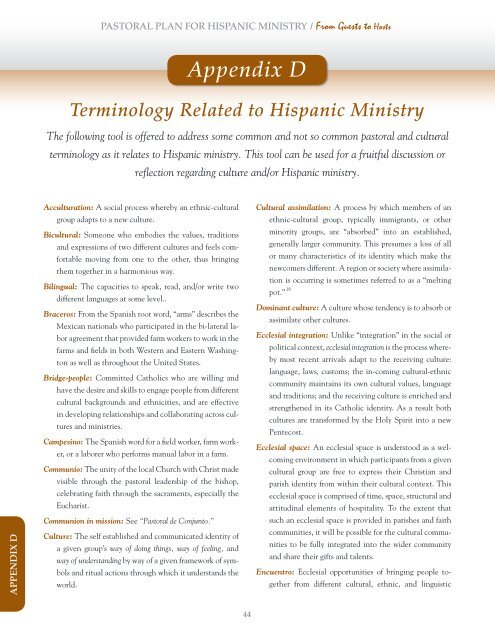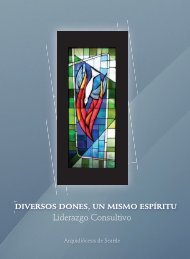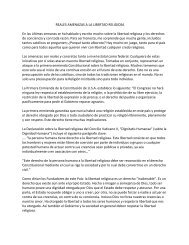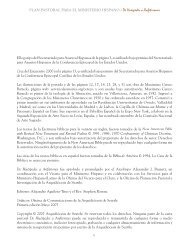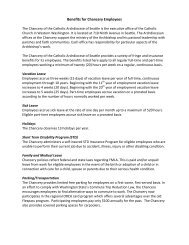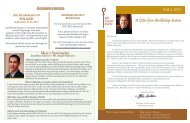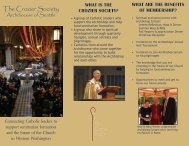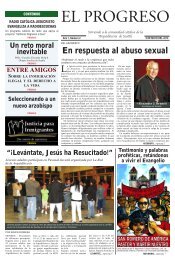<strong>Pas<strong>to</strong>ral</strong> <strong>Plan</strong> <strong>for</strong> <strong>Hispanic</strong> <strong>Ministry</strong> / <strong>From</strong> <strong>Guests</strong> <strong>to</strong> <strong>Hosts</strong>Appendix DTerminology Related <strong>to</strong> <strong>Hispanic</strong> <strong>Ministry</strong>The following <strong>to</strong>ol is offered <strong>to</strong> address some common and not so common pas<strong>to</strong>ral and culturalterminology as it relates <strong>to</strong> <strong>Hispanic</strong> ministry. This <strong>to</strong>ol can be used <strong>for</strong> a fruitful discussion orreflection regarding culture and/or <strong>Hispanic</strong> ministry.Appendix DAcculturation: A social process whereby an ethnic-culturalgroup adapts <strong>to</strong> a new culture.Bicultural: Someone who embodies the values, traditionsand expressions of two different cultures and feels com<strong>for</strong>tablemoving from one <strong>to</strong> the other, thus bringingthem <strong>to</strong>gether in a harmonious way.Bilingual: The capacities <strong>to</strong> speak, read, and/or write twodifferent languages at some level..Braceros: <strong>From</strong> the Spanish root word, “arms” describes theMexican nationals who participated in the bi-lateral laboragreement that provided farm workers <strong>to</strong> work in thefarms and fields in both Western and Eastern Washing<strong>to</strong>nas well as throughout the United States.Bridge-people: Committed Catholics who are willing andhave the desire and skills <strong>to</strong> engage people from differentcultural backgrounds and ethnicities, and are effectivein developing relationships and collaborating across culturesand ministries.Campesino: The Spanish word <strong>for</strong> a field worker, farm worker,or a laborer who per<strong>for</strong>ms manual labor in a farm.Communio: The unity of the local Church with Christ madevisible through the pas<strong>to</strong>ral leadership of the bishop,celebrating faith through the sacraments, especially theEucharist.Communion in mission: See “<strong>Pas<strong>to</strong>ral</strong> de Conjun<strong>to</strong>.”Culture: The self established and communicated identity ofa given group’s way of doing things, way of feeling, andway of understanding by way of a given framework of symbolsand ritual actions through which it understands theworld.Cultural assimilation: A process by which members of anethnic-cultural group, typically immigrants, or otherminority groups, are “absorbed” in<strong>to</strong> an established,generally larger community. This presumes a loss of allor many characteristics of its identity which make thenewcomers different. A region or society where assimilationis occurring is sometimes referred <strong>to</strong> as a “melting18pot.”Dominant culture: A culture whose tendency is <strong>to</strong> absorb orassimilate other cultures.Ecclesial integration: Unlike “integration” in the social orpolitical context, ecclesial integration is the process wherebymost recent arrivals adapt <strong>to</strong> the receiving culture:language, laws, cus<strong>to</strong>ms; the in-coming cultural-ethniccommunity maintains its own cultural values, languageand traditions; and the receiving culture is enriched andstrengthened in its Catholic identity. As a result bothcultures are trans<strong>for</strong>med by the Holy Spirit in<strong>to</strong> a newPentecost.Ecclesial space: An ecclesial space is unders<strong>to</strong>od as a welcomingenvironment in which participants from a givencultural group are free <strong>to</strong> express their Christian andparish identity from within their cultural context. Thisecclesial space is comprised of time, space, structural andattitudinal elements of hospitality. To the extent thatsuch an ecclesial space is provided in parishes and faithcommunities, it will be possible <strong>for</strong> the cultural communities<strong>to</strong> be fully integrated in<strong>to</strong> the wider communityand share their gifts and talents.Encuentro: Ecclesial opportunities of bringing people <strong>to</strong>getherfrom different cultural, ethnic, and linguistic44
Appendix D — Terminology Related <strong>to</strong> <strong>Hispanic</strong> <strong>Ministry</strong> / <strong>From</strong> <strong>Guests</strong> <strong>to</strong> <strong>Hosts</strong>groups in the local church and parish communities withthe purpose of promoting mutual enrichment by honoringtheir cus<strong>to</strong>ms, languages, religious traditions andexpressions of popular piety through sharing.Encuentros: National consultation processes convened bythe U.S. Bishops with the purpose of studying and reflectingon the status of <strong>Hispanic</strong> ministry in order <strong>to</strong>identify priorities and pas<strong>to</strong>ral action. The encuentroshave served <strong>to</strong> direct the pas<strong>to</strong>ral process of <strong>Hispanic</strong>ministry along common guidelines of action <strong>for</strong> approximatelythe last 35 years at the national level.Enculturation: A social process whereby an establishedculture teaches an individual the accepted norms andvalues of the culture or society in which the individuallives.Ethnic Group: A group whose members identify with eachother on the basis of a common his<strong>to</strong>ry, background orancestry. Ethnic groups are usually united by commoncultural, behavioural, linguistic, or religious practices. Inthis sense, an ethnic group is also a cultural community.<strong>Guests</strong>: Newcomers or new arrivals <strong>to</strong> a parish or faith community.Typically, these are immigrants who have notyet established a sense of belonging <strong>to</strong> the parish and arenot yet involved in the parish structure. See hosts as thecounterpart <strong>to</strong> guests.<strong>Hispanic</strong>/Latino: The term “<strong>Hispanic</strong>” was used during the1970 Census and was adopted by the church leadershipof the time <strong>to</strong> help define a people with a common identity,vision, and mission. The term “Latino” has becomewidely used by church and community leaders, particularlyin urban areas. It is a self-identifying term that hasemerged from the community and is also embraced by19the Church.<strong>Hispanic</strong> ministry: It is the organized and ongoing responseof the Church <strong>to</strong> welcome and accompany <strong>Hispanic</strong>s inencountering and following Jesus Christ, thus becomingactive participants in the life of the Church and itsevangelizing mission.His<strong>to</strong>rical memory: A people’s collective understanding oftheir own culture, his<strong>to</strong>ry, values and identity.<strong>Hosts</strong>: Parishioners who belong and participate fully in thelife and mission of a local parish or faith communtiy, andwho have been fully invested <strong>to</strong> share their gifts, especiallyin welcoming and empowering other newcomers.See guests as the counterpart <strong>to</strong> hosts.Illegal: See undocumented.Incorporation: Refers <strong>to</strong> becoming or being a member of theBody of Christ through baptism.Inculturation of the Gospel: Refers <strong>to</strong> the Church’s ef<strong>for</strong>ts<strong>to</strong> immerse the Word of God in the lives of particularcultures, thus affirming what is good in them and bringingcloser <strong>to</strong> Christ aspects that need trans<strong>for</strong>mation.Mestizaje: Term of Spanish origin <strong>to</strong> designate the mixturebetween European and Indigenous peoples. The termis the focus of current cultural and theological trendswhich address the his<strong>to</strong>rical, cultural and spiritual coming<strong>to</strong>gether of two disparate parent peoples <strong>to</strong> generatea new people, a new culture, and a new spirituality. LatinAmerican peoples are mestizo.Migra: A Spanish word <strong>Hispanic</strong> immigrants use <strong>to</strong> refer <strong>to</strong>the “INS” (Immigration and Naturalization Services),which has been renamed <strong>to</strong> “ICE” (Immigration andCus<strong>to</strong>ms En<strong>for</strong>cement).Multicultural: A social reality in which distinctly differentcultural-ethnic groups co-exist with equal status. In apas<strong>to</strong>ral setting it has typically been applied <strong>to</strong> culturalethnicgroups other than the mainstream group.Nationality: This term is used <strong>to</strong> identify a person’s orgroup’s country of origin, i.e. a “Mexican” is someonewho comes from Mexico, a Salvadoran is someone fromEl Salvador, and a “Canadian” is from Canada, etc.National parishes: During that late 1800s and early 1900s,the Church in the United States established nationalparishes as an effective ecclesial model <strong>to</strong> welcome immigrantsfrom the different European nations (Italy,Poland, Germany, Ireland, France, etc.) many of whomwere Catholic. This model provided each communitywith the ecclesial space they needed <strong>to</strong> live their faith,<strong>to</strong> pray and <strong>to</strong> worship, and <strong>to</strong> build community in the20context of their own language, culture and traditions.Newcomers: See guests.Our Lady of Guadalupe, Mother of the Americas: PopeJohn Paul II referred <strong>to</strong> Our Lady of Guadalupe as Motherof the Americas during the Synod <strong>for</strong> America. TheAppendix D45


